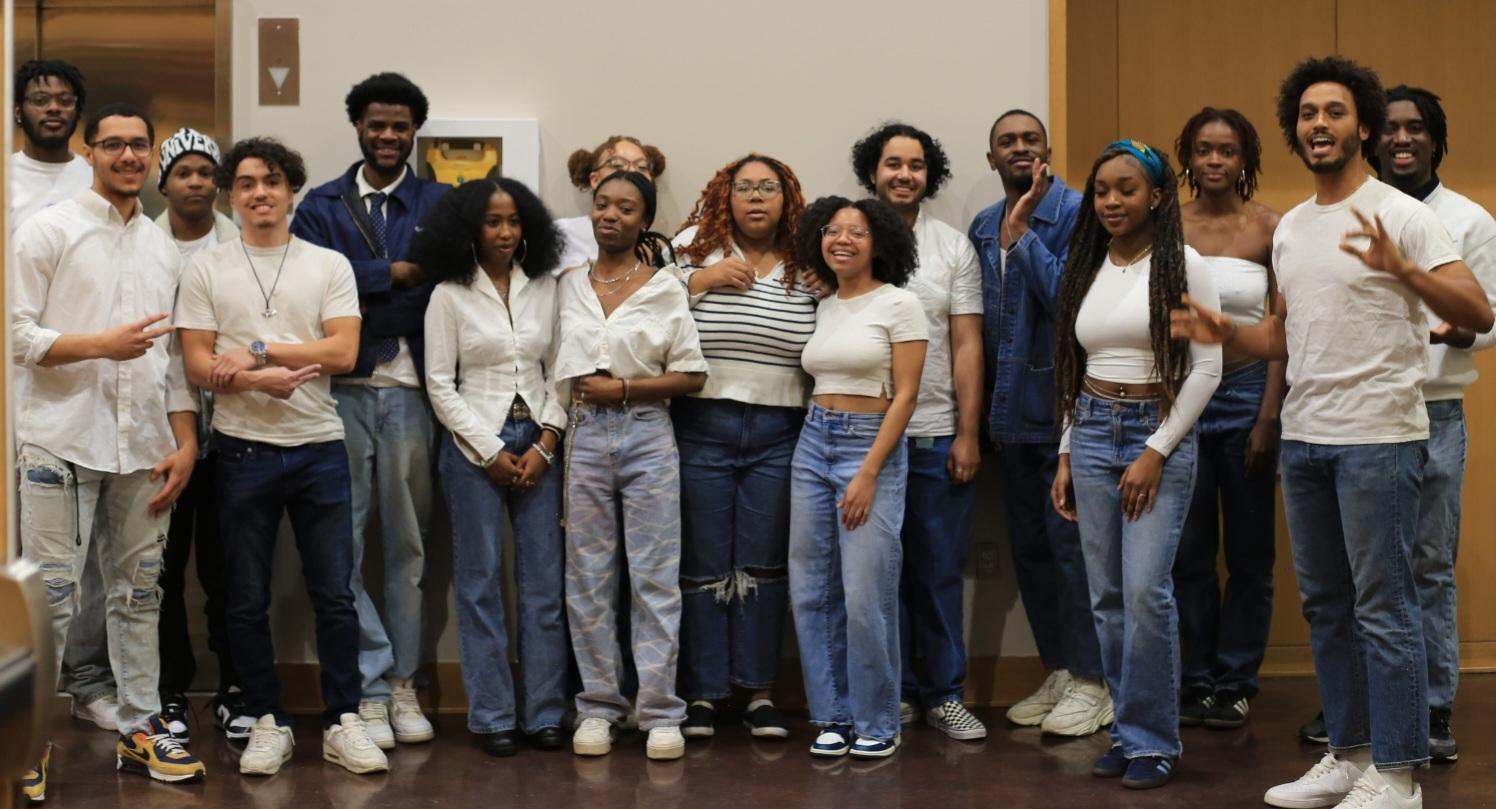
Black Raspberry, an all-Black art collective, was started by Neo Fleurimond ’24 two years ago. Since then, it has transformed into a music group with multiple other artistic branches, allowing members to explore all different forms of expression. The group has revolutionized the music scene at Wesleyan, making space for historically underrepresented genres at the school, like hip-hop and R&B, to take the main stage. They even had the opportunity to open for Tierra Whack at last year’s Spring Fling. The Argus sat down with three of the seniors from Black Raspberry to discuss their experience with the collective.
The Argus: Can you introduce yourselves?
Neo Fleurimond: I’m Neo. I’m a senior at Wesleyan [majoring in African American Studies (AFAM) with a] concentration in music. I’m [the] founder, band director, and saxophonist for Black Raspberry, and I’m really excited to graduate with an amazing group of people.
Judeley Jean-Charles: I’m a senior [majoring in Computer Science. I’m the] keyboardist [and] vice president for Black Raspberry. [I am] also founder and CEO of TrueLife Records, [an] independent record label I have here on campus [that’s] working with musical people, but all thanks to Black Raspberry for creating a space of just allowing people to flourish.
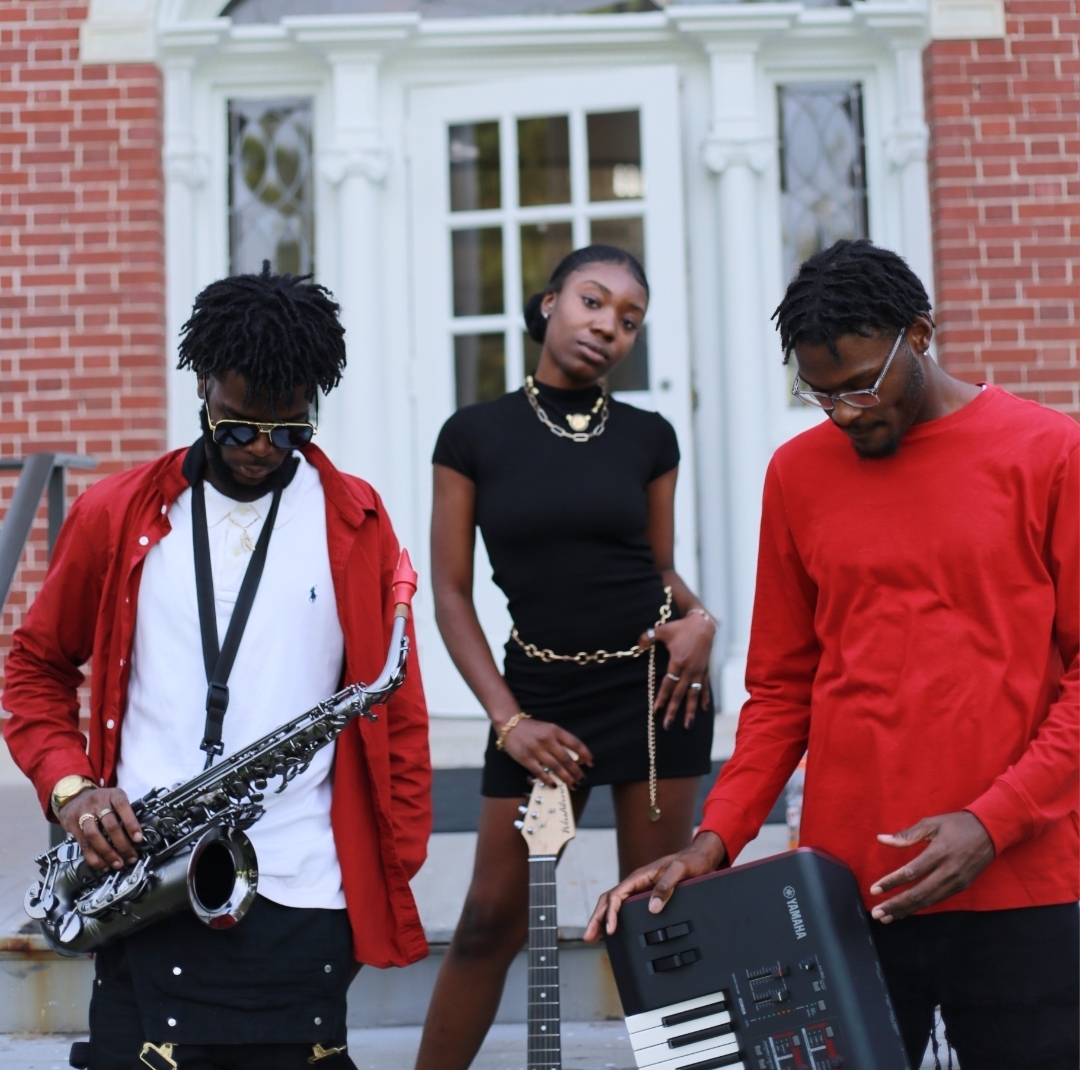
Jazmin Davis: I’m a senior [majoring in Psychology] and French. [I’m the] guitarist and vice president [of Black Raspberry].
A: What was the inspiration for creating Black Raspberry, and how have you seen it flourish over time?
NF: I started in a band in high school. It wasn’t an all-Black band, but it was based on brotherhood because I went to an all-boys school. We were doing so many amazing things. I was expecting to find that everywhere. But the reality [is] that the world doesn’t look as diverse as I thought it was going to be. So the goal [of starting Black Raspberry] was to create a space that emulated those things and sentiments I felt in high school. It took an amazing group of people who saw a vision but also wanted to uplift and pursue both individual dreams and a unified dream at the same time. [That made] things a lot easier, because when dreams align, it makes achieving goals a lot easier. There’s also campus support. People root for us, and it feels like we’re underdogs a lot of times, but then we end up succeeding in situations where it’s crazy to succeed. I’m so happy that we get to create the changes that we want to see, whether it’s individually or communally.
JJC: I was [one of] the original members. It’s been a great space to be able to realize that there are so many other people who enjoy music. We [have] all combined with all our different personalities and [are] still able to just have fun.
A: Do you guys want to talk about your experience joining?
NF: We can talk about the original Black Raspberry, [which] was 2021. It was me, Judeley, and Christina Onuzuruike ’24 just goofing off [in X House]. It was supposed to be a trio. But then I was like, this can be way bigger, because I’ve seen what it looks like when multiple instruments and multiple diasporas of instrumentation come together. The goal was then to bring that into [a] collective [and] consistent space.
JD: My experience was a little different from [Judeley’s]. I wasn’t a part of that initial blossoming. My experience started freshman year when Neo overheard me playing guitar casually in 200 Church. I didn’t think anything of it. Then junior fall, over winter break, Neo hit me up, [and] he was like: “I want you to join my band.” I’d been hoping for a way to dip my toes in a little bit. I thought it was going to be a lot more casual—just jam sessions here and there—but it turned out to be this all-consuming thing. I feel like that was meant to be. I feel like that helped me grow a lot as a person [and] a guitarist. I never thought I would be doing the stuff I’m doing now.
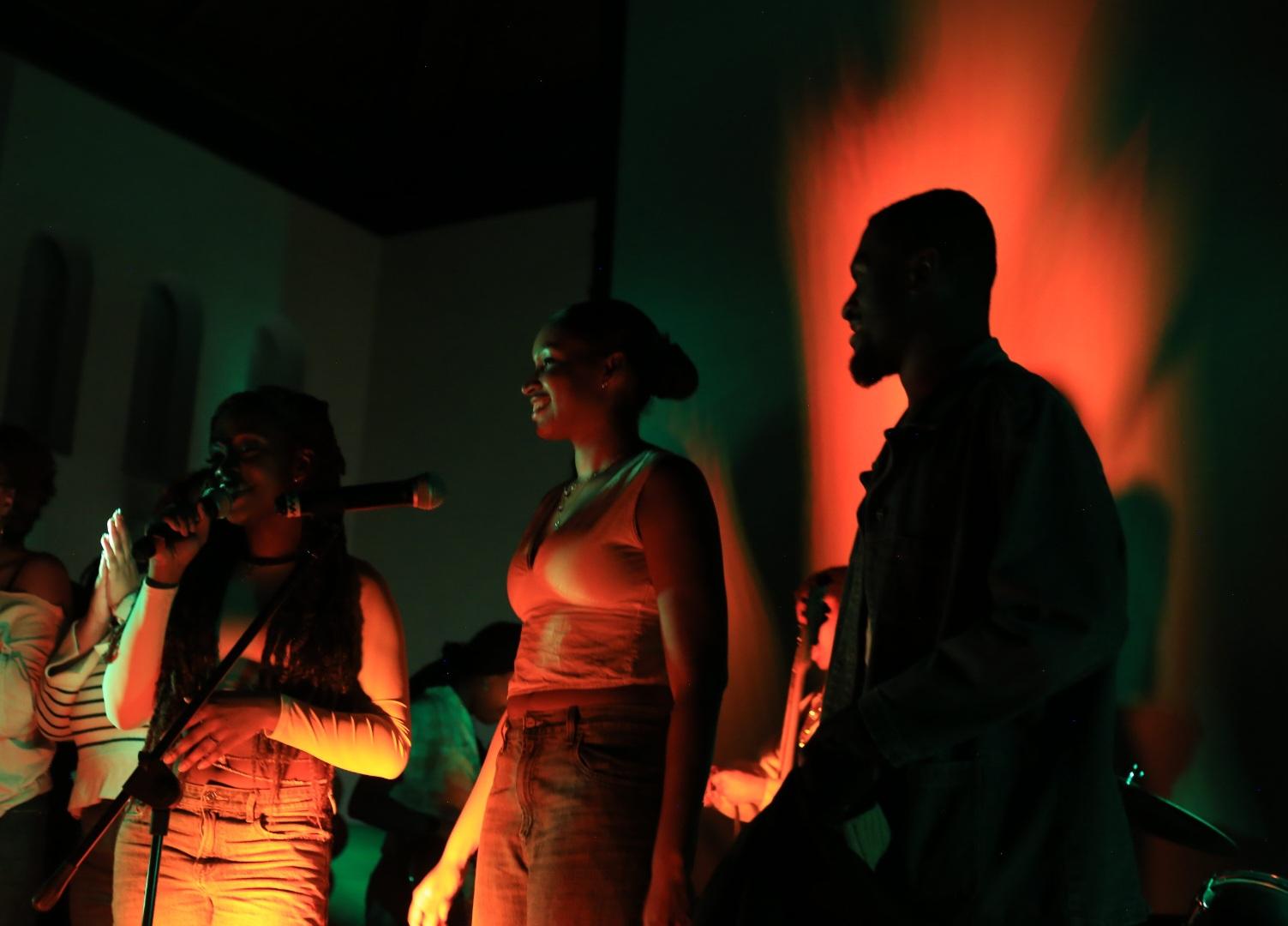
JJC: I was dealing with a lot of stuff. I don’t know if [I joined because] at the time, I was dealing with having a baby on the way or other [personal] things. I saw one of their performances at Psi U. I just loved the energy, and I didn’t see any [other bands on campus] bringing R&B and hip-hop [together]. So, I hit Neo up. I’m very thankful for that, because if it wasn’t for that, I don’t know where I’d be right now. I don’t think True Life Records would [exist]. So many butterfly effects. It’s just such a beautiful space.
A: What do you see as the future of Black Raspberry on campus or off campus?
JD: I know that [Neo] has been making moves to expand it past just Wesleyan. Even now, it’s expanded past Wesleyan because we have a few musicians who are mostly based in New York, and they come and visit to play for shows. As for the future of Black Raspberry on campus, I feel like it’s become a space that’s more than just a band. People are given the space to share their art in so many other ways, like visual arts, murals, and Lincoln [Turner’s ’25] play. I know it’s gonna be a lot different because [the group is] mostly seniors [now]. It started with our grade, but I feel like however it does change, it still will have that essence.
JJC: There’s always a need for change. As seniors, [we’ve seen] the space [change] in so many different ways, from being a great band to being a family and just enjoying each other’s presence. Black Raspberry [is] a space for a lot of different Black [people] to be creative. I didn’t understand how important that was until somebody said, “I’ve never been around this many Black people ever in my life.” Even though that may seem like nothing to me because I have a different perspective, it’s a different type of family love. It’s very beautiful that we can have that space for other people.
NF: I think that the beauty of change is that it comes in so many shapes and sizes, and that is the beauty of Black Raspberry having so many different personalities. It enforces the idea of change and growth. There’s so much personal growth within each member. I’ve felt so proud watching [everyone’s] successes, but also knowing that it’s inspired so many people beyond Wesleyan. [Jazmin] mentioned bringing in musicians from my old high school. Those are the musicians that have seen this. We’ve gone to other campuses, and [they’ve said], “We wish we had something like this.” It puts things in perspective that if there are spaces that look like this outside of Wesleyan, it wouldn’t be too crazy to say that I can see it making a huge dent in the structure of academia. I think that change would be a lot better for Black creatives and creatives in general.
A: Where did the name Black Raspberry come from?
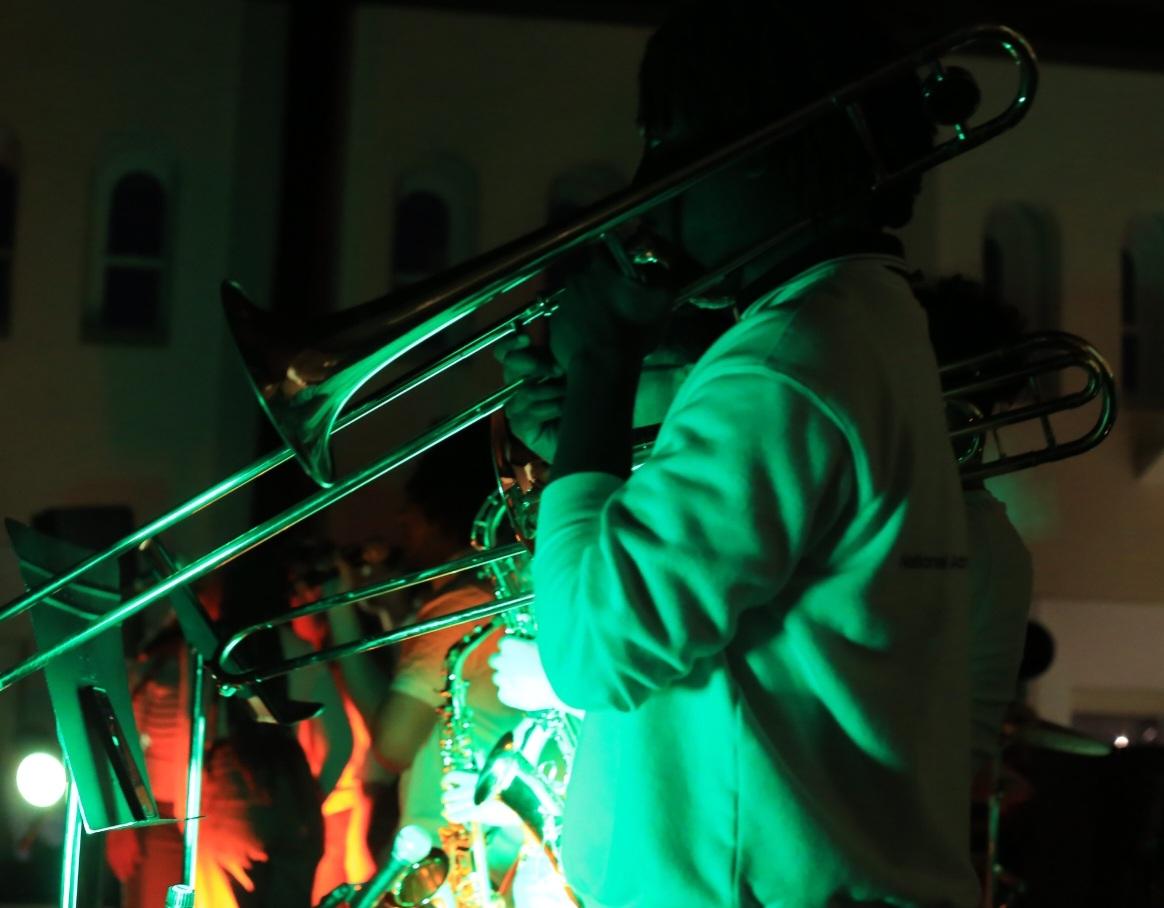
NF: Christina.
JJC: Everyone was so addicted to the black raspberry ice cream [from Usdan]. Christina was going crazy about the ice cream. And then we all tried it. And then we had our name.
A: Do you guys mainly do covers, or do you also write your own music?
JJC: We have written some original songs like “Set Back.” We performed that for Battle of the Bands. And that allowed us to play for Spring Fling.
JD: I feel like since it’s grown from a band into a collective, now, there’s a lot more individual creation. A lot of the members in the band collaborate to make music. It’s kind of hard to create something original, [to] organize that many people and accommodate that many ideas. But we try to capture that essence of creativity through our arrangements. That way, we have the foundation of a song that we all know and love, [and] then we just like to make our own little twist so each section has its own creative touch.
A: Can you explain what sections are?
JD: We have our horn section [led by] Alise Mackey ’24. And then there’s the rhythm section, which is me and Judeley, and bass, which is Kailer [Brothers ’25], and drums, which is sometimes Pelumi [Sokunbi ’25] and sometimes Neo’s [friend from high school] Jasiah. We also have [a vocal section and a guitar section]. Because [the band] is so big, it’s not the same arrangement every time. And then there’s also [a] video team.
NF: We [also] have the visual art department. We have the film department, which has smaller subsections. I’m in a Harlem Renaissance class, talking about the actual installments of change that were used in this legacy-defining movement, and a lot of it was taking different niches and talent and passion and trying to display resistance through performance or demonstration of your untapped creative potential. I feel like Black Raspberry has done a lot for musicians, but I wanted to do more for more creatives on campus, and so [I wanted to bring] them into a space that lets them just be themselves as much as possible, but also [provides] the resources needed to put those visions to life.
A: What was it like opening for Spring Fling last year?
JJC: Spring Fling was a hectic day. We had planned for the day to run a certain way, and then it went the whole opposite direction, but that’s life. First, the sound check was running [late], so we were very pressed for time [when we were] trying to rehearse. When we went on [stage], it was just a beautiful moment to see all of us on a big stage in front of a crowd. It was such a great day to see all of [our] accomplishments right in front of our eyes. [We prepared] five songs in total. [When the event started,] we did [our first] three songs, and we had two songs left to do. But [at that point], the sound people [told us to get off stage].
We were all confused because [they] didn’t give a heads up. [But] we [hadn’t] finished our performance [yet]. There was so much adrenaline, and we were all looking at each other like, “What the hell?” [I thought,] we’re not gonna leave the stage. We worked too hard. So I started playing our song. It was supposed to be the intro, but I was so nervous [that] I was playing [wrong] notes. But I think everybody knew what I was trying to go for.
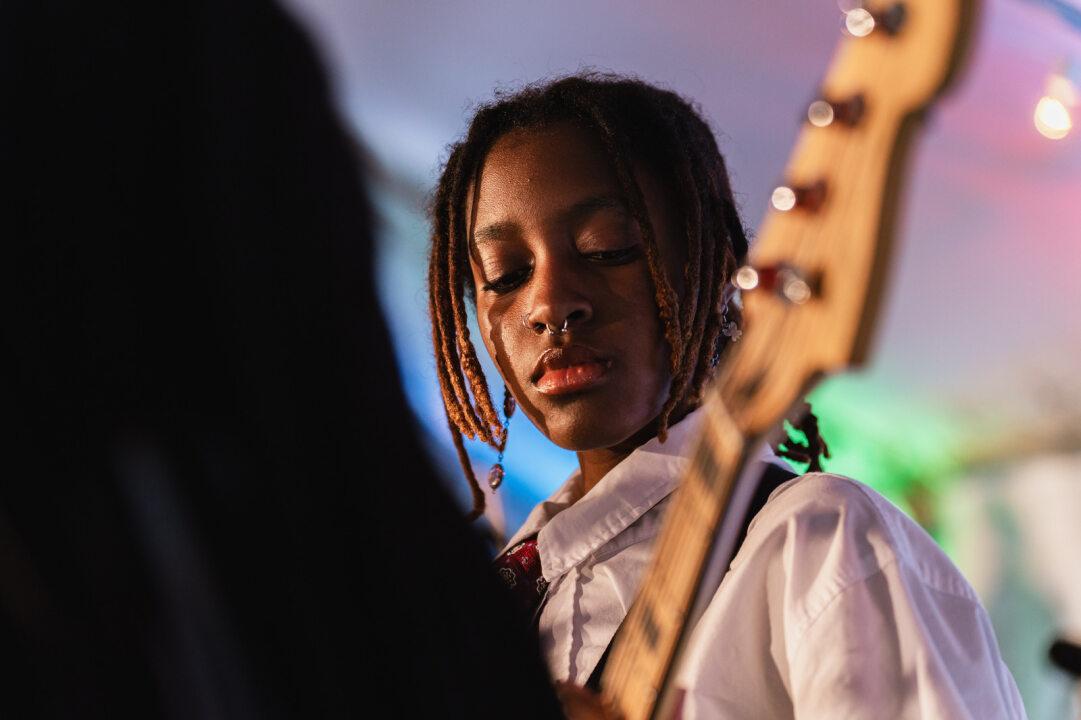
JD: We had a [chaotic] sound situation, [and] we couldn’t hear each other. The arrangement of the stage is so big [that] there were blind spots. But when we all heard Judeley’s first notes, we just [synchronized] so crazily, even though Judeley was nervous. Once we all started together, it felt like such a moment, and [the sound people] couldn’t even stop it. I feel like it was a moment among [all of] us and [the people in] the audience. I love that feeling when I start to play a song and people start singing along.
We brought the crowd into Spring Fling. Just being the ones to kickstart that event—even though it was hectic leading up to it—there’s something about performing where we all get so connected energetically. I feel like that’s why we [are] so close. It’s such a bonding experience being under such pressure and then just leaning on each other and trusting in the process.
A: What advice would you give yourself at the beginning of this process?
NF: If I could go back to my past self, there are so many things I’d say I should do better. But I think that’s the beauty of growth. I wish I told my past self, “Hey, listen, this ain’t gonna be no regular band on campus that performs like once every week. It’s gonna be a real family.” It feels more like an orchestra sometimes than a band. I wish I had felt more prepared to take on that responsibility. But I’m glad that I made so many friends that helped me and want to see [the group] uplifted.
JD: If I were to go back to my freshman year self, before I joined, [my advice] would be to join, trust the process, and lean into my creativity as well. Don’t be afraid to take up space. Be confident in your own capabilities as a musician, a friend, and a leader.
JJC: I’m a big believer in [going] through mistakes and learning and growing. So, I wouldn’t give myself advice because then I wouldn’t learn. I would just allow myself to be more confident because I think [self-consciousness] limited me from being able to be creative and have fun.
Jo Harkless can be reached at jharkless@wesleyan.edu.
Lia Franklin can be reached at lfranklin@wesleyan.edu.


Leave a Reply